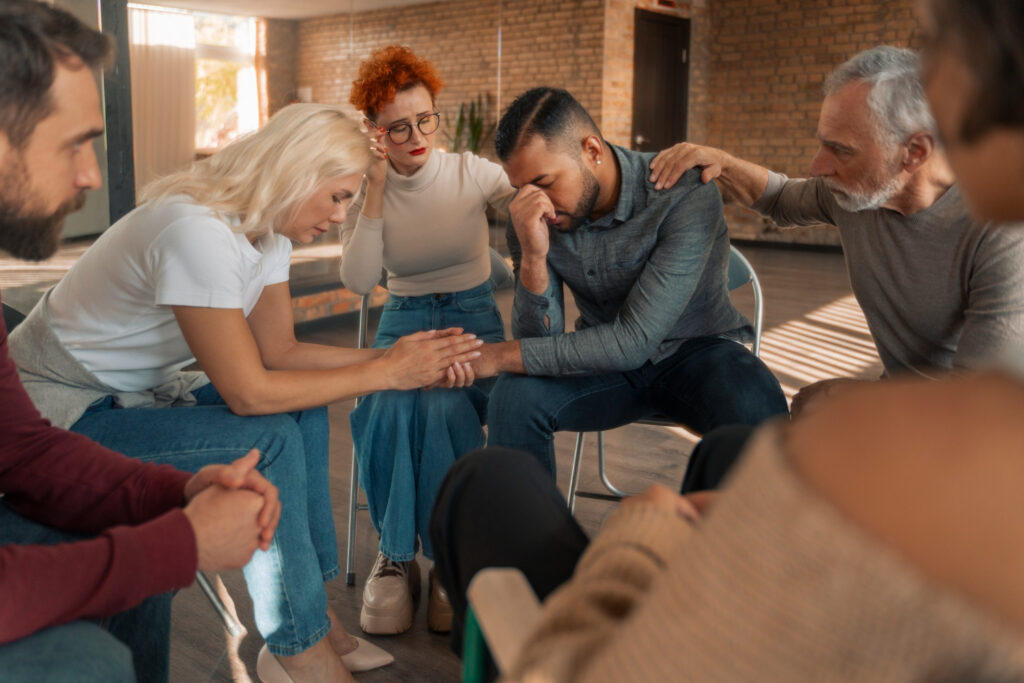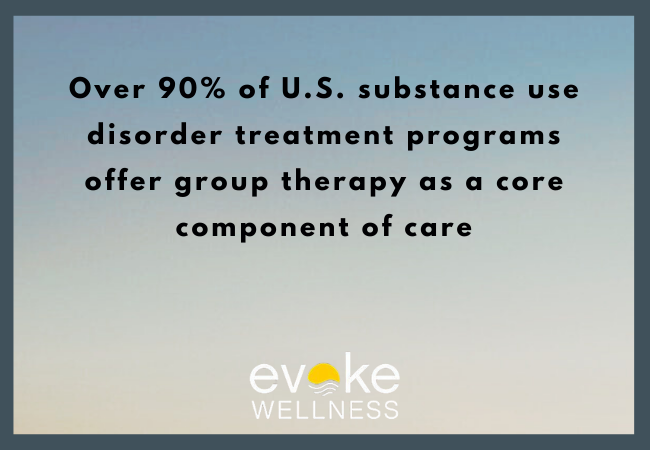Group therapy is a powerful tool in the journey to overcoming addiction and mental health challenges. It provides a supportive environment where individuals can share experiences, learn coping strategies, and develop a sense of community. Through guided discussions and structured sessions, participants gain valuable insights into their struggles while building connections that foster long-term recovery.
What Is Group Therapy?
Group therapy is a structured form of psychotherapy where participants meet regularly under the guidance of a licensed therapist to explore shared experiences, emotions, and challenges. Unlike support groups (which are often peer-led), clinical group therapy is facilitated by trained mental health professionals and is designed to help participants:
-
Develop insight into their behavior and emotions
-
Practice healthy communication and coping skills
-
Build social support and reduce isolation
-
Gain new perspectives and accountability from peers
At Evoke Wellness, group therapy is integrated into every level of care and is tailored to match clinical goals and client needs.
Role of Group Therapy in Behavioral Health
Behavioral health encompasses mental well-being and substance use treatment. Group therapy is a cornerstone of this field, helping individuals address underlying psychological issues that contribute to addiction. A behavioral health treatment center in Florida offers structured group therapy programs led by licensed professionals, ensuring a safe and constructive environment for recovery.
Benefits of Group Therapy for Mental Health
Group therapy provides several benefits for individuals struggling with mental health conditions, including:
- Shared Understanding: Hearing others’ experiences helps participants feel less alone in their struggles.
- Skill Development: Therapy sessions teach coping mechanisms to manage stress, anxiety, and depression.
- Accountability: Regular sessions encourage individuals to stay committed to their recovery goals.
- Peer Support: Encouragement from others fosters resilience and motivation.
- Improved Communication: Engaging in discussions helps individuals express themselves more effectively.
How Group Therapy Aids in Addiction Recovery
Individuals recovering from substance use disorders often benefit from group therapy due to the peer support and shared experiences it provides. Some of the key ways it aids recovery include:
- Breaking Isolation: Addiction often leads to social withdrawal. Group therapy reintegrates individuals into a supportive network.
- Identifying Triggers: Participants learn to recognize personal triggers through shared discussions.
- Developing Coping Strategies: Therapists guide members in creating personalized relapse prevention plans.
- Building Confidence: Sharing personal victories, no matter how small, boosts self-esteem and reinforces progress.
Different Types of Group Therapy in Mental Health Treatment
A mental health treatment center in Florida offers various types of group therapy, tailored to meet individual needs. Some common forms include:
We provide a variety of group therapy formats across all treatment programs to address the complexities of mental health and addiction:
1. Process Groups
Open discussions that help individuals process thoughts, emotions, and life experiences in a safe, supportive setting.
2. Psychoeducational Groups
Focus on teaching key topics such as:
-
Addiction science
-
Relapse prevention
-
Emotional regulation
-
Trauma awareness
-
Mental health literacy
3. Cognitive-Behavioral Groups
Centered on CBT techniques, these groups help identify and challenge negative thinking patterns and promote healthier behaviors.
4. Skills-Building Groups
Participants learn and practice practical life skills such as:
-
Communication strategies
-
Stress management
-
Time management
-
Goal setting
5. Relapse Prevention Groups
Specifically designed for individuals in addiction recovery, these groups teach coping tools, identify high-risk situations, and build recovery confidence.
6. Experiential or Creative Groups
Using art, music, journaling, or movement to foster emotional expression and connection in non-verbal ways.
Science Behind Group Therapy
Research shows that group therapy is highly effective in treating both addiction and mental health disorders. According to the American Psychological Association (APA), individuals who participate in group therapy often experience significant improvements in mood, self-awareness, and interpersonal relationships.
A study by the National Institute on Drug Abuse (NIDA) found that individuals in group therapy programs had higher rates of long-term sobriety compared to those who relied solely on individual counseling. The sense of accountability and peer encouragement plays a crucial role in sustained recovery.
Group Therapy vs. Individual Therapy: Which One is Right for You?
While both forms of therapy offer benefits, the choice depends on personal needs and circumstances. Individual therapy provides personalized attention and privacy, whereas group therapy fosters a sense of belonging and shared experience. Many treatment programs incorporate both to maximize recovery outcomes.
Overcoming Stigma Associated with Group Therapy
Some individuals hesitate to join group therapy due to fears of judgment or discomfort in sharing personal struggles. However, studies indicate that the majority of participants find group therapy to be a positive and transformative experience. Destigmatizing mental health treatment services is crucial in encouraging more individuals to seek help.
Group Therapy for Co-Occurring Disorders
Many individuals with substance use disorders also struggle with mental health conditions such as depression, PTSD, or anxiety. Group therapy sessions tailored for co-occurring disorders address both aspects simultaneously, improving overall treatment success rates. A Mental Health Treatment Services in Florida that offers integrated treatment ensures that individuals receive comprehensive care.
Role of Family in Group Therapy
Family involvement can enhance the effectiveness of group therapy. Many programs incorporate family therapy sessions where loved ones learn about addiction and mental health challenges, helping to rebuild relationships and create a supportive home environment.
Choosing the Right Group Therapy Program
Selecting a therapy program that aligns with personal needs is essential for long-term recovery. Factors to consider include:
- Qualified Therapists: Ensure that licensed professionals lead the sessions.
- Program Specialization: Some groups cater to specific issues such as trauma or dual diagnosis.
- Session Frequency: Regular participation enhances effectiveness.
- Comfort Level: Finding a group where individuals feel safe and supported is key.
What to Expect as a First-Time Participant
It’s normal to feel nervous before your first group therapy session. Many clients fear judgment, discomfort, or the vulnerability of opening up in front of others. At Evoke Wellness, we meet you where you are—never forcing participation, but gently encouraging progress.
During your first sessions, expect:
-
A welcoming, confidential space
-
A trained therapist leading and guiding the conversation
-
Respectful ground rules for communication
-
A mix of listening, learning, and voluntary sharing
-
Gradual comfort as trust builds with your peers
Take the First Step Toward Healing
Recovery doesn’t happen in a vacuum—and neither does healing. Group therapy creates a space where people learn from each other, support one another, and grow together. It is a space of transformation, connection, and courage.
If you or a loved one is struggling with addiction or mental health challenges, group therapy can be a transformative part of recovery. At Evoke Wellness, we provide comprehensive mental health treatment services in Florida designed to support you every step of the way. Call us today at 866.429.2960 or contact us to begin your healing journey.
Frequently Asked Questions (FAQ)
What is group therapy, and how is it different from support groups?
Group therapy is a form of psychotherapy led by a licensed mental health professional. It differs from peer-led support groups (like 12-Step meetings) by focusing on clinically guided topics, structured goals, and therapeutic interventions designed to improve mental health and recovery outcomes.
What types of issues are addressed in group therapy?
Group therapy can help with a wide range of concerns, including:
-
Substance use disorders
-
Depression and anxiety
-
Trauma and PTSD
-
Emotional regulation
-
Self-esteem and communication challenges
At Evoke Wellness, group sessions are tailored to meet the specific needs of our clients at different levels of care.
Do I have to speak in group therapy?
While sharing is encouraged, no one is ever forced to speak. Many clients find comfort in listening before they’re ready to participate. Over time, trust builds naturally, and most individuals begin to feel safe opening up.
Is group therapy effective for people with co-occurring mental health and substance use disorders?
Yes. Group therapy is a proven part of dual-diagnosis treatment and is highly effective for individuals dealing with both mental health and addiction. It provides support, structure, and coping tools for managing both conditions in an integrated way.



